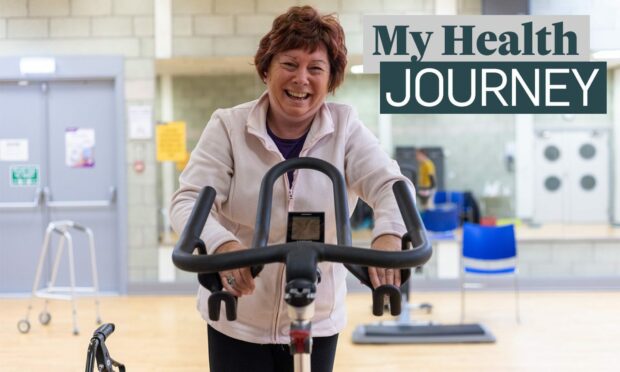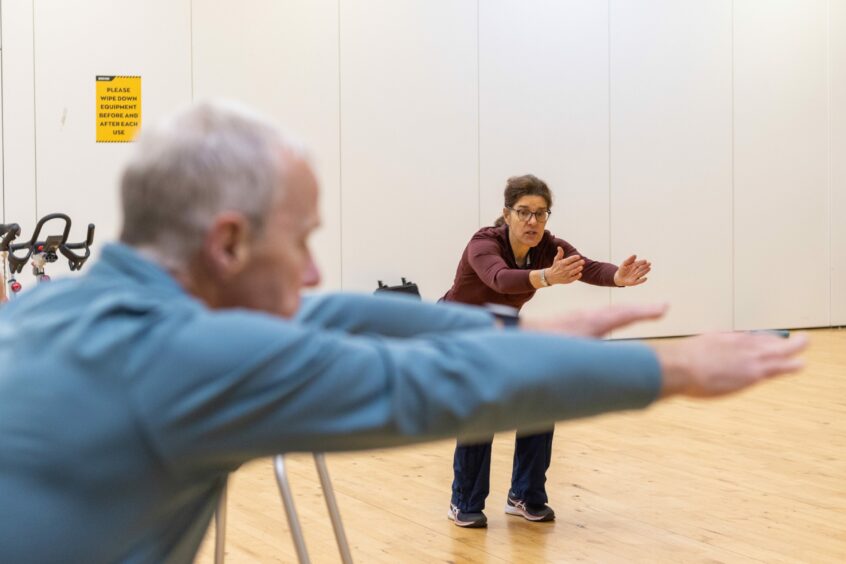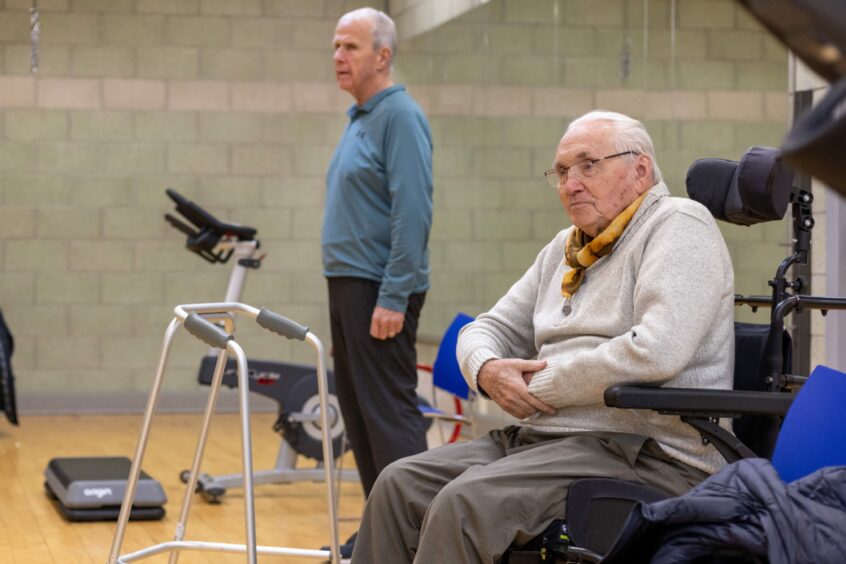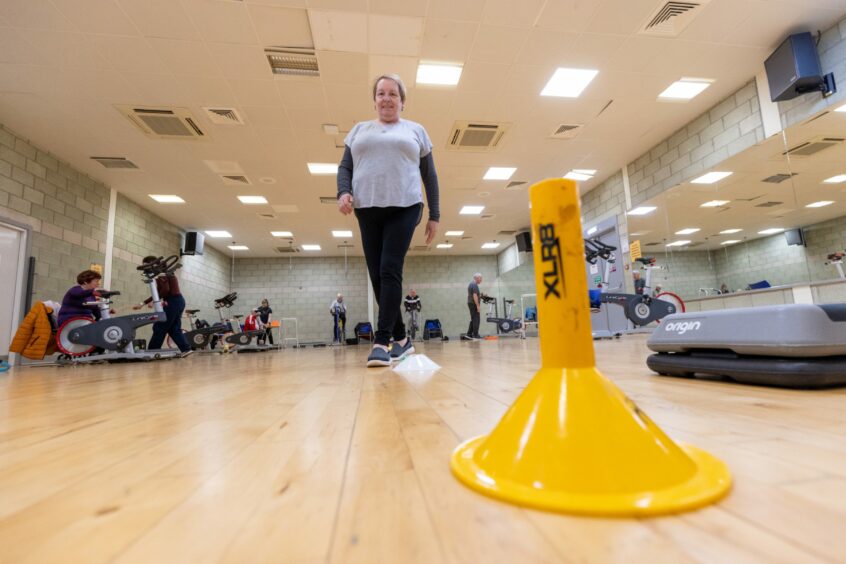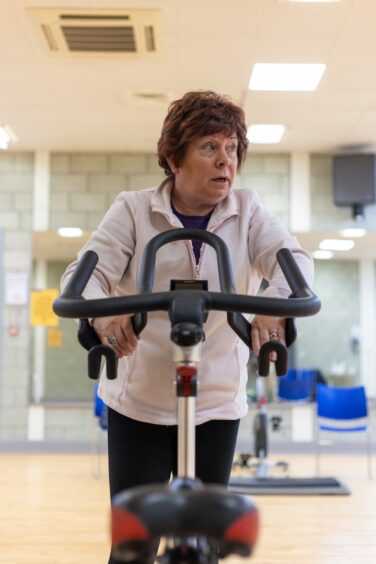Irene Murray is showing me how little movement she had in her right arm after a stroke put her in Aberdeen Royal Infirmary.
“I could lift it about that much off the bed,” she says, raising her arm about two or three centimetres. She shakes her head and her mood turns a shade darker.
Irene – one of those people whose default outlook is radiant positivity – recalls the panic of inhabiting a body that suddenly won’t do what it’s told.
“I thought, what’s happening to me?” she says. “I had to be propped up, I couldn’t sit up. It was terrifying.”
Eight years on, and Irene is thriving. She still relies a walker – and an occasional helping hand from husband Colin.
But talking to me in the reception area of RGU’s sports hall, there are only a few signs of the stroke that she says “turned my world upside down”.
“One of my goals was to go to the bathroom,” she says with a big smile, her positivity returned. “When I was able to do that, the feeling! Oh, boy.”
Step Ahead Aberdeen and its colourful crew
Irene’s recovery is the reason I’m at the Garthdee university campus.
Once a week, the 67-year-old drives in with Colin from Ellon to join a colourful cohort of fellow stroke survivors.
In a spacious downstairs room in the sports hall, they take part in a physiotherapy class – called Step Ahead Aberdeen – designed to get them moving.
It is a diverse bunch. Among the number today are a social worker from Mastrick, an oil and gas base manager who has lived all over the world and an 88-year-old geologist who helped create a landmark map of the UK’s soil.
But they all share two things in common. First, at some point in their lives, the blood supply to their brains was cut off, causing them to have a stroke.
And second, like Irene they possess a remarkable determination to keep their bodies moving and regain the mobility they once thought their condition had stolen from them.
Or as Irene puts it with typical ebullience: “We have a positive attitude. If you don’t have that people will get fed up of you, including yourself.”
Ten years of progress and community
Step Ahead Aberdeen celebrates its 10th anniversary this weekend with a birthday bash in Dyce.
A host of current members will be there to eat birthday cake and pay tribute to the close-knit community that has grown out of the exercises classes.
In the decade since it started, Step Ahead has grown from just seven people in a draughty hall in Banks o’ Dee to about 40 participants at four weekly RGU classes.
Started by stroke survivors together with physiotherapists at Aberdeen sports therapy clinic Spear, the Tuesday and Wednesday sessions are much like other fitness classes, but tailored for people that have suffered a stroke.
On the Tuesday I visit, Spear physios Sarah and Teegan are leading the class.
Teegan is in charge of the Spotify playlist and asks everyone what music they want. There’s a muted response.
“It’s not always this quiet,” Irene shouts at me from across the room.
Meanwhile, Sarah gets the class warmed up with some light movements – gentle squats followed by standing on tip toes.
One of the class – Andy – is in a wheelchair and is stretching his limbs as much as he can. I see him wince as he straightens his knee, a reminder of the hard work taking place underneath the camaraderie.
The good times and the bad at Step Ahead Aberdeen
Warm up over, Irene and the rest of the class climb aboard the stationary bikes set up around the room.
As they peddle, I chat to John Bibby, who tells me all about his long career with Aberdeen’s John Hutton Institute where he travelled the country grading soil for its agricultural quality.
The system he helped set up is still in use today, and John delightedly tells me all about the high-grade soil in my home county of Fife.
John’s stroke was in 2010 and despite still limited movement in his left hand, he is determined to keep going.
“You need to keep looking ahead,” he tells me as he spins the hand pedals on his specially-adapted bike. “Keep your nose going forward.”
But there are dark moments, too, he admits.
In his youth, John, whose job took him all over the countryside, would think nothing of bounding up a munro or two.
Now, two years shy of his 90th birthday and reliant on a wheelchair, his main connection to the outdoors is through TV shows about hillwalking.
But seeing the lush grass and vegetation just makes him ache for the real thing.
“I can smell the TV screen,” he says with a rueful laugh.
Across the gym, social worker Wendy Patterson talks about the joy she’s had being able to ten-pin bowl again.
The 61-year-old couldn’t grip with her bowling hand and, as she tells it, was throwing ball after ball down the gutter.
About 18-months ago, however, something clicked, helped by her physio at Step Ahead.
“I started winning again!” she says.
‘Occasionally, you might have to crack the whip’
Speaking on the phone a few days after the RGU session, Spear physio Lynn Wilson says the benefits of Step Ahead are two-fold.
There is the physical improvement from the exercises her and her colleagues oversee.
But just as important is the mental boost from being part of a community, and the collected focus on getting better.
“There’s tremendous peer support to the classes,” says Lynn, who has been part of Step Ahead almost since its inception.
“The classes all begin to look out for each other and really bond. They share a lot of information, for example, on going on holiday again for the first time after their stroke, or places that are good to visit.”
But it’s not all holiday tips and catching-up. There is some serious exercise going on.
Lynn says she’s aware that some of the group refer to her and her colleagues as the “physio terrorists” because of how hard they make them work.
“Occasionally, you might have to crack the whip,” she admits with a laugh. “But usually it’s because there’s a bit more chatting than exercise.”
How Irene overcame her first-day nerves
Back in the gym, Irene is pushing through the discomfort barrier on her exercise bike.
And the former school teacher remembers how on her very first day at Step Ahead, she was so nervous she nearly backed out.
She’s very glad she didn’t.
“I was really worried,” she says. “I didn’t want the doors to open, I was so worried about how I would do.
“But now I absolutely love it.”
For anyone interested in joining the Step Ahead Aberdeen sessions, get in touch with Spear sports therapy clinic in Aberdeen. Participants undergo an assessment before they can take part in the classes, which costs £12 per session. Step Ahead Aberdeen is funded by its members along with funding from a number of charities. The group is hoping it can secure sponsorship from a local firm.
